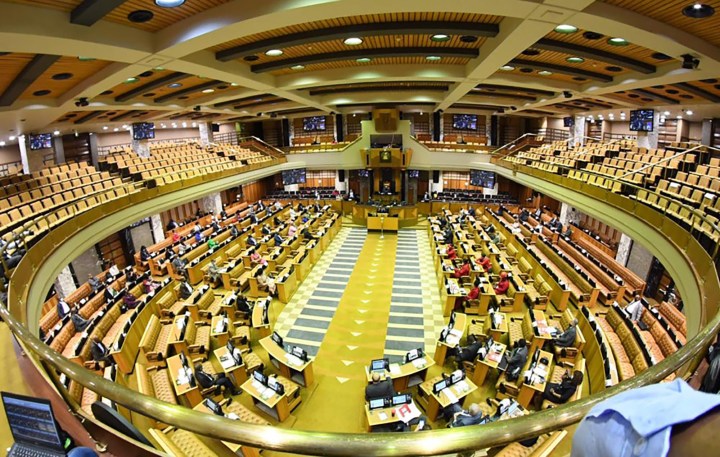DM168 Analysis
South African politics: Control the optics, control the narrative of progress

But controlling the optics comes nowhere near accountability, responsiveness and openness. These are the pesky foundational values of the Constitution that in 2021 marks its 25th anniversary.
First published in the Daily Maverick 168 weekly newspaper.
Optics. These increasingly seem central to South African politics – and governance. Control of optics equals control of the narrative. And that narrative is one of progress made.
On Monday, President Cyril Ramaphosa delivered his 18th address to the nation since declaring the State of Disaster on 15 March 2020. This Saturday, South Africa has been in lockdown for 345 days.
Headlined, as always, “Statement by President Cyril Ramaphosa on progress in the national effort to contain the Covid-19 pandemic”, the speech unfolds with the president next to the national flag.
It can be argued these 30- to 40-minute speeches are unmediated direct communication, and thus democratic. But by their character addresses to the nation are one-way communication by a president to the people at particular moments in a nation’s life. They are not everyday, and are not meant to be.
Yet the regularity of such speeches indicate the Presidency is using them as a key communication channel. It allows for control of optics. No pesky questions. Or tjatjarigness from opposition benches in the House.
Because, actually, statements of national importance like Covid-19 should also be made in Parliament, the people’s assembly.
The Presidency and government’s control of optics controls the narrative of progress. It’s heavily biased towards visuals, as shown by Deputy President David “DD” Mabuza’s visit to the Biovac Institute vaccine storage.
Then maybe add a dash of folksiness. That Ramaphosa did when he got the vaccine with several healthcare workers at the Khayelitsha District Hospital. “I mustn’t cry. No crying. Can I close my eyes?” asked Ramaphosa, who kept his eyes open.
But controlling the optics comes nowhere near accountability, responsiveness and openness. These are the pesky foundational values of the Constitution that in 2021 marks its 25th anniversary. South Africa’s supreme law was adopted by Parliament on 8 May 1996 and signed into law by then-president Nelson Mandela on 10 December 1996.
The Presidency has no committee in Parliament it accounts to. Opposition parties have called for this, unsuccessfully.
Neither is there a parliamentary committee for the National Coronavirus Command Council (NCCC), although it plays a fundamental role in South Africa’s governance. Ditto, NatJoints (National Joint Operation and Intelligence Structure), which brings together police, soldiers and spooks in a structure that does not account publicly, but monitors and recommends on the Covid-19 lockdown.
The official line is that the NCCC is a committee of Cabinet. But a parliamentary reply shows all Cabinet ministers are in the NCCC, raising questions for the need of a command council in a constitutional democracy where Cabinet is the executive decision-maker.
Ramaphosa long ago stopped saying “the NCCC decided” in his addresses to the nation, and now always references a Cabinet decision.
But those Cabinet meetings, if tracked through official statements issued afterwards, do not tally with the presidential addresses to the nation. An exception is in early December 2020: a Cabinet meeting on 2 December for which a statement was issued on 4 December after Ramaphosa’s 3 December address to the nation that declared Nelson Mandela Bay Metro a hotspot with greater restrictions. The Cabinet statement talks about that.
Ramaphosa also delivered Covid-19 addresses to the nation on 28 December, 11 January, 1 February and 28 February, talking about “Cabinet decided”. But official Cabinet statements were issued only for 19 January 2021, 10 February and 24 February 2021.
A briefing from the NCCC on Covid-19 was mentioned only in the statement of 24 February. And although Ramaphosa in Monday’s address to the nation said “Cabinet decided earlier today…”, an official statement on that Cabinet meeting remains outstanding.
At best, the argument is that a Cabinet statement isn’t necessary because the president has spoken, even if other possible Cabinet decisions beyond Covid-19 lockdown remain unknown. At worst, this disjunction indicates greatly muddied governance, and a broken trail of executive decision-making.
And that, ultimately, optics can’t fix. DM168
Marianne Merten has been writing on Parliament for Daily Maverick since 2016.
This story first appeared in our weekly Daily Maverick 168 newspaper which is available for free to Pick n Pay Smart Shoppers at these Pick n Pay stores.





















 Become an Insider
Become an Insider
Hear, hear. As long as South Africa is held under the Disaster Management Act the government can, and does, rule by decree. As we currently stand the Constitution is being tossed out the window on a monthly basis, civil rights are effectively suspended and citizens can be locked down at a moments notice and on a whim. This is an invidious position for the citizens of properly functioning countries but with our nascent democracy staggering under the weight of decades of chronic mismanagement by a ruling party as corrupt, opportunistic and inept as that of the ANC while citizens are indefinitely disenfranchised from their constitutional rights, the situation is dire. There is no need for maintaining the current status quo and to continue poses serious danger to our constitutional imperatives.
The ANC narrative of unrelenting progress since 1994 – why we place emphasis on this year is a further bone of contention, the mantle substantially passed in 1990 – simply is not true. Stuttering progress in the 1990’s, slowing to a crawl in “the Mbeki missed years” where primary producing countries such as Australia, climbed in, benefitting massively from the China-inspired mining boom, but that totally passed us, slowing to a mere dribble during the “lost nine years” and negative of course during this last “command and control” year of debacle.
So like Stalinist Russia, who starved his peoples the better to instil “discipline” via fear, NDZ amply adopted the same course, which Ramaphosa is either disinterested, or cannot, undo.